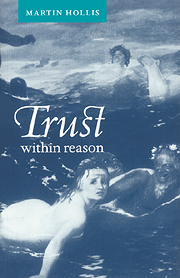Summary
The problem of trust lies in what Kant termed ‘man's asocial sociality’. If we were wholly asocial, there would be no trust; if wholly social, no problem. Since we have both elements, however, we need to decide how elastic to make the bond of society. Is it one which adapts to who we are and where we belong? This would be a plausible answer if the question were solely one of who does in practice trust whom. But it is not an answer within reason to an Enlightenment question of who merits trust. That may yet turn out to be a moral question requiring the moral answer that only those who act uprightly should be trusted. But, if this implies a Kantian moral point of view, its universalising character is double-edged. It shows how trustworthy persons can overcome the perils of prudence and reach The Triumph of Reason. But it does so by making each so unconditionally moral that progress along the trail does not depend on trust at all. Hence it neither captures the conditional character of everyday trust nor lets us ask which social relations generate trust-within-reason.
Reason grants that one can find many examples of trust, as in honour among thieves, teamwork among terrorists and a shared sense of mission among missionaries. It does not grant that these are all examples of trust-within-reason, however, and we need to know which, if any, it approves. To ask, we must explore the idea that we are more embedded in social relations than modern individualists usually allow.
- Type
- Chapter
- Information
- Trust within Reason , pp. 105 - 125Publisher: Cambridge University PressPrint publication year: 1998



